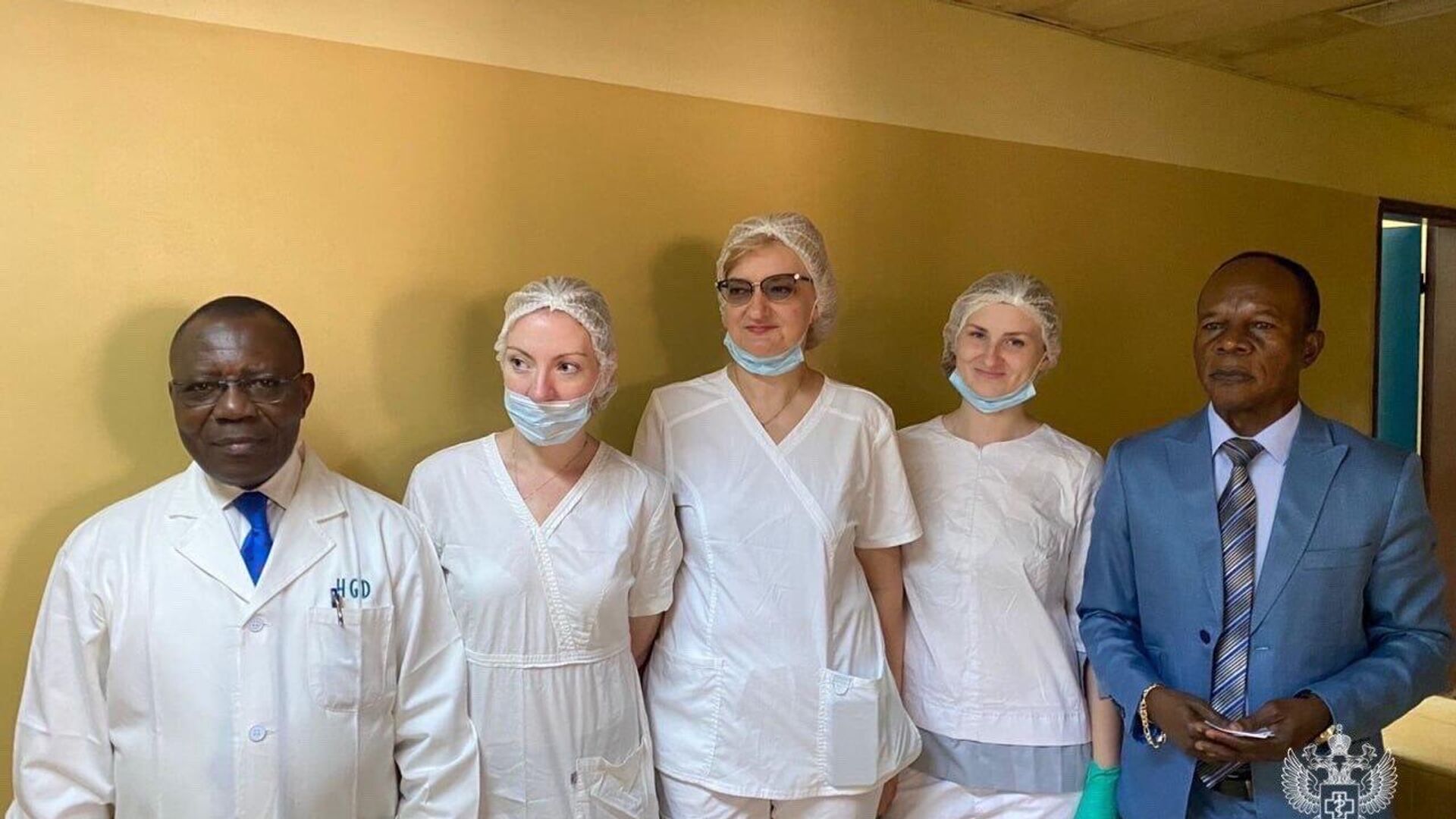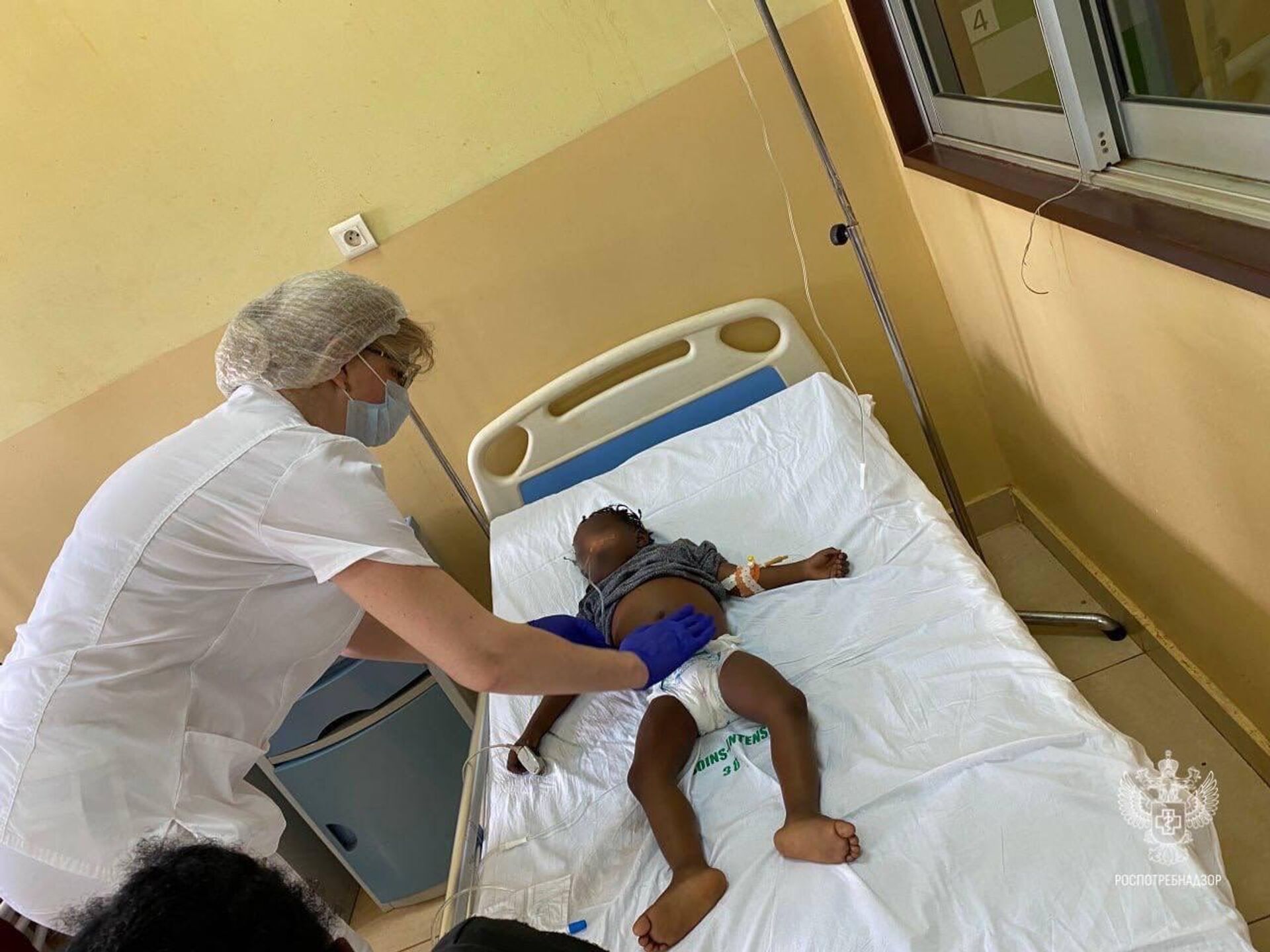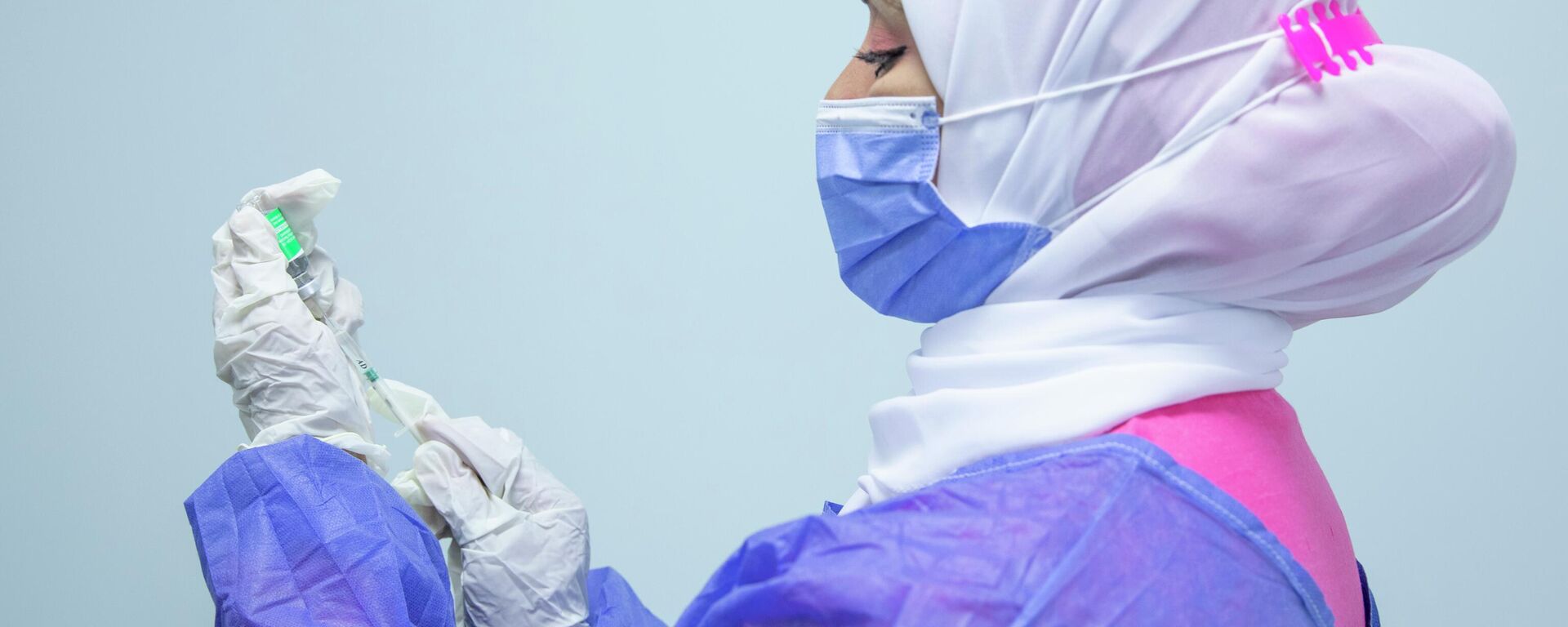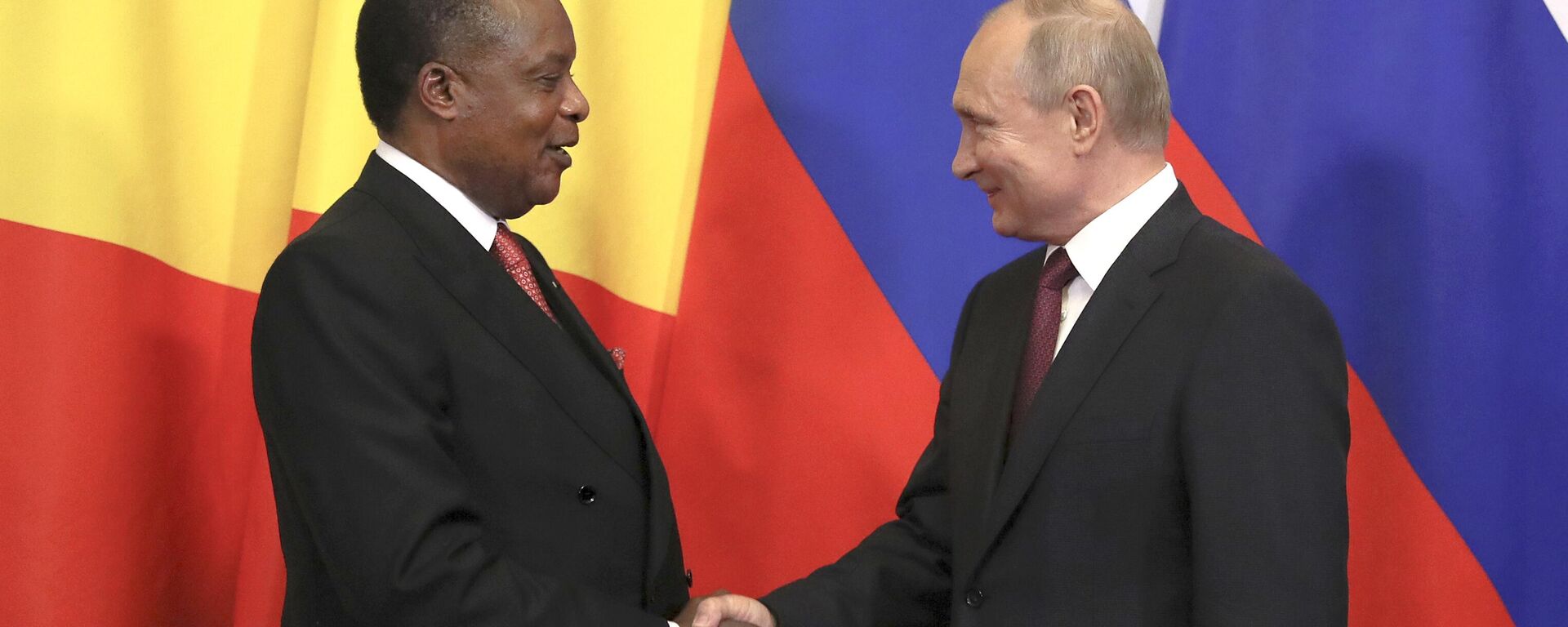https://en.sputniknews.africa/20230910/russian-health-mission-to-fight-infections-in-congo-deemed-a-success-1061907612.html
Russian Health Mission to Fight Infections in Congo Deemed a 'Success'
Russian Health Mission to Fight Infections in Congo Deemed a 'Success'
Sputnik Africa
A Russian medical team was deployed in the Republic of the Congo to help the country overcome an outbreak of intestinal infections in August, according to the... 10.09.2023, Sputnik Africa
2023-09-10T13:09+0200
2023-09-10T13:09+0200
2023-09-11T09:57+0200
republic of the congo (congo)
health
russia
medicine
russia-africa cooperation
features
vladimir putin
guinea
sputnik africa
africa in details
https://cdn1.img.sputniknews.africa/img/07e7/09/06/1061916586_0:120:1280:840_1920x0_80_0_0_9b3fc19c5b69078ea7fad73296f494d7.jpg
A team sent by the Russian health agency Rospotrebnadzor has helped overcome an outbreak of intestinal infections in Congo in a single month, deputy head at the Central Research Institute of Epidemiology, Natalia Pshenichnaya - who was also on the mission - said in an interview with Sputnik Africa.According to the specialist, Congo offered all the necessary conditions to succeed in this work both in Dolisie, the third-largest city in the country and at the national level. The mission was marked by "a very friendly and open atmosphere," the doctor emphasized, adding that the specialists understood each other very well with the help of the Congolese doctor, who studied Russian.Throughout the joint work, the Congolese implemented all the Russian recommendations, which "certainly brought the expected results in terms of reducing the incidence of intestinal infections," the deputy head of clinical and analytical work of the research institute stressed.Moreover, the Russians came across some surprising medical cases during this mission, according to Pshenichnaya. Speaking about personnel that are usually required for this kind of mission, the professor said that members included epidemiologists, laboratory diagnostics specialists and infectious disease specialists.As for the necessary equipment, Pshenichnaya revealed that the Rospotrebnadzor specialists were provided by Russia with a modern mobile laboratory, which was "very well-equipped" and was "installed very quickly."In addition, the Russian sanitary agency always offers classical bacteriological research methods that were "really necessary in the context of complex diagnostics," according to the researcher.Team Tasks Regarding the tasks of her group, the infectious disease specialist said that her Russian colleagues had the task of examining patients, understanding what diagnoses had previously been made in local hospitals and discussing with doctors in detail the principles of isolating these patients with various diseases to prevent outbreaks of nosocomial infections. Furthermore, they had to work on the issue of antiepidemic measures, discuss treatment regimens according to the suspected diseases, as well as the rules for discharge from the hospital, because patients must leave the hospital in good health, not posing a health threat to others. For Pshenichnaya, this was not her nor her team's first experience on the African continent.Rapid Deployment of Mission According to Pshenichnaya, the fact that this team was formed and sent to Congo within 48 hours after the decision was made, however, is common practice, noting that there are special rapid response teams for this purpose.Each specialist concerned has a suitcase ready to be able to leave urgently, in two or three hours, she underlined. There are several such teams at the Russian sanitary agency, "because outbreaks of infectious diseases can occur simultaneously in two or three countries," the infectious disease specialist stressed, noting that each time, new young specialists join these mobile teams to share the experience and ensure a certain continuity. Along with specialists, medical equipment is prepared just as quickly, Pshenichnaya highlighted.As part of this mission, the Russian infectious disease specialists had equipment, test systems and a special tent designed specifically for the installation of a mobile laboratory in the place where the focus of infection is located. This tent ensures compliance with the anti-epidemic regime and appropriate ventilation, the deputy head explained. According to the professor, after the departure of the Russian group, the African infectious disease specialists inherited the laboratory, with a complete set of Russian-made reagents, including those developed by the Research Institute of Epidemiology. Future RelationsThe Russian health agency plans to continue its work with Congo, Pshenichnaya said, citing the special program for African countries in the study of infection prevention announced by Vladimir Putin during the Russia-Africa Summit at the end of July. Apart from this, to supply the established laboratory, the Russian sanitary agency could provide various diagnostic systems for infectious diseases on request, the doctor revealed, adding that, in Burundi and Guinea, there are support bases of Rospotrebnadzor that carry out extraterritorial surveillance there.The infectious disease specialist was pleased with her visit to the country and wants to return and continue cooperation.The specialists of the Russian sanitary agency are ready "not only to travel in the event of such epidemics, but also to cooperate in the knowledge exchange both for laboratory diagnostics and in general for the management of patients with various infectious diseases," Pshenichnaya concluded.
https://en.sputniknews.africa/20230823/first-cases-of-new-coronavirus-variant-eg5-in-confirmed-in-egypt-ministry-of-health-1061556026.html
https://en.sputniknews.africa/20230809/russian-courses-for-health-workers-begin-in-republic-of-congo-1061191832.html
republic of the congo (congo)
russia
guinea
Sputnik Africa
feedback@sputniknews.com
+74956456601
MIA „Rossiya Segodnya“
2023
Rasina Musallimova
https://cdn1.img.sputniknews.africa/img/07e7/0a/17/1063019139_0:0:646:646_100x100_80_0_0_348c74b69cf86748a53875f8148a2f85.jpg
Rasina Musallimova
https://cdn1.img.sputniknews.africa/img/07e7/0a/17/1063019139_0:0:646:646_100x100_80_0_0_348c74b69cf86748a53875f8148a2f85.jpg
News
en_EN
Sputnik Africa
feedback@sputniknews.com
+74956456601
MIA „Rossiya Segodnya“
Sputnik Africa
feedback@sputniknews.com
+74956456601
MIA „Rossiya Segodnya“
Rasina Musallimova
https://cdn1.img.sputniknews.africa/img/07e7/0a/17/1063019139_0:0:646:646_100x100_80_0_0_348c74b69cf86748a53875f8148a2f85.jpg
republic of the congo (congo), health, russia, medicine, russia-africa cooperation, vladimir putin, guinea, sputnik africa, africa in details
republic of the congo (congo), health, russia, medicine, russia-africa cooperation, vladimir putin, guinea, sputnik africa, africa in details
Russian Health Mission to Fight Infections in Congo Deemed a 'Success'
13:09 10.09.2023 (Updated: 09:57 11.09.2023) Longread
A Russian medical team was deployed in the Republic of the Congo to help the country overcome an outbreak of intestinal infections in August, according to the Russian health agency Rospotrebnadzor.
A team sent by the Russian health agency Rospotrebnadzor has helped overcome an outbreak of intestinal infections in Congo in a single month, deputy head at the Central Research Institute of Epidemiology, Natalia Pshenichnaya - who was also on the mission - said in an interview with Sputnik Africa.
"This mission had been a success," she said.
According to the specialist, Congo offered all the necessary conditions to succeed in this work both in Dolisie, the third-largest city in the country and at the national level.
"Everything that depended on our colleagues from the Republic of the Congo has been fully realized. We talked with doctors and members of the laboratory. We examined the patients and also communicated with them. We also got acquainted with the medical records and the results of laboratory tests, as well as the medicines that were in the pharmacies. That is, all the information that interested us was provided to us immediately," she noted.
The mission was marked by "a very friendly and open atmosphere," the doctor emphasized, adding that the specialists understood each other very well with the help of the Congolese doctor, who studied Russian.
"We were surprised by the cordiality with which our colleagues from Congo received us. There was not even a language barrier thanks to a Congolese woman doctor who had studied at a Russian university. Some of her colleagues also spoke Russian, while some members of the Russian team spoke French," the professor highlighted.
Throughout the joint work, the Congolese implemented all the Russian recommendations, which "certainly brought the expected results in terms of reducing the incidence of intestinal infections," the deputy head of clinical and analytical work of the research institute stressed.
Moreover, the Russians came across some
surprising medical cases during this mission, according to Pshenichnaya.
"What we had not seen in Russia was when patients were simultaneously diagnosed with, for example, two diseases: malaria, which is naturally endemic in the Republic of the Congo, and one of the intestinal infections that were observed there. Although the simultaneous treatment of malaria and intestinal infections is quite logical for us, nevertheless, for me, it was a first experience," the researcher said.
Speaking about personnel that are usually required for this kind of mission, the professor said that members included epidemiologists, laboratory diagnostics specialists and infectious disease specialists.
"Generally, these missions, which are focused on research on an epidemic of an infectious disease as well as on the organization of anti-epidemic measures and assistance in the treatment of patients with various infectious diseases, are carried out by epidemiologists, laboratory diagnostics specialists and infectious disease specialists," the doctor explained.
As for the necessary equipment, Pshenichnaya revealed that the Rospotrebnadzor specialists were provided by Russia with a modern mobile laboratory, which was "very well-equipped" and was "installed very quickly."
"Of course, without modern laboratory equipment, the mission cannot be considered complete. Due to this, Rospotrebnadzor specialists always travel with a mobile laboratory specializing in diagnostics and using the most modern research methods. This is mainly a polymerase chain reaction, that is, molecular genetic methods. [...] It was installed literally in one or two days. [...] And then we had already checked exactly what diseases the patients were suffering from at that time," she underlined.
In addition, the Russian sanitary agency always offers classical bacteriological research methods that were "really necessary in the context of complex diagnostics," according to the researcher.
Regarding the tasks of her group, the infectious disease specialist said that her Russian colleagues had the task of examining patients, understanding what diagnoses had previously been made in
local hospitals and discussing with doctors in detail the principles of isolating these patients with various diseases to prevent outbreaks of
nosocomial infections. Furthermore, they had to work on the issue of antiepidemic measures, discuss treatment regimens according to the suspected diseases, as well as the rules for discharge from the hospital, because patients must leave the hospital in
good health, not posing a health threat to others.
"That is why, as part of our work, we organized all these events and, accordingly, drafted recommendations that we discussed with our colleagues from Congo," she argued.
For Pshenichnaya, this was not her nor her team's first experience on the African continent.
"Previously, the colleagues worked in Guinea. They also worked in Vietnam, some of them even went to the disaster zone in Lebanon [the double explosion in the port of Beirut] in 2020. There was also a work experience in South Africa, amid the spread of the Omicron coronavirus variant. We went with a mobile laboratory - epidemiologists, laboratory diagnostics specialists, infectious disease specialists - precisely when there was the greatest rise in morbidity," the professor recalled.
Rapid Deployment of Mission
According to Pshenichnaya, the fact that this team was formed and sent to
Congo within 48 hours after the decision was made, however, is common practice, noting that there are special rapid response teams for this purpose.
"This is not the first mission, and the scheme of actions is already being worked out. There is a certain set of equipment, that is, systems necessary for getting to such foci of infectious diseases. There are special antiepidemic teams in Rospotrebnadzor, in fact, these are rapid response teams. These are specialists of various profiles, as I have already said, epidemiologists, infectiologists, virologists, bacteriologists," the doctor emphasized.
Each specialist concerned has a suitcase ready to be able to leave urgently, in two or three hours, she underlined.
"This is the special forces for combating infectious diseases of Rospotrebnadzor. We already have such a well-coordinated team that everyone knows what they have to do," the researcher added.
There are several such teams at the Russian sanitary agency, "because outbreaks of infectious diseases can occur simultaneously in two or three countries," the infectious disease specialist stressed, noting that each time, new young specialists join these mobile teams to share the experience and ensure a certain continuity.
Along with specialists, medical equipment is prepared just as quickly, Pshenichnaya highlighted.
"The complete set of supplies for equipment, the composition of test systems and diagnostic kits comes immediately. That is, in general, experts immediately go to the aircraft bridge, taking equipment with test systems," the doctor said.
As part of this mission, the Russian infectious disease specialists had equipment, test systems and a special tent designed specifically for the installation of a mobile laboratory in the place where the focus of infection is located. This tent ensures compliance with the anti-epidemic regime and appropriate ventilation, the deputy head explained.
According to the professor, after the departure of the Russian group, the
African infectious disease specialists inherited the laboratory, with a complete set of Russian-made reagents, including those developed by the Research Institute of Epidemiology.
"We have provided a short training so that our Congolese colleagues can continue to work on this equipment. This will make laboratory diagnostics more effective, which will make it possible to quickly make accurate diagnoses for patients and, in accordance with this, to already implement antiepidemic measures," she summed up.
The Russian health agency plans to continue its work with Congo, Pshenichnaya said, citing the special program for African countries in the study of infection prevention announced by Vladimir Putin during
the Russia-Africa Summit at the end of July.
"The program was implemented almost immediately. I hope that in the future, firstly, colleagues from Congo will come to us for different classes on diagnostic of infectious diseases. But also that our specialists will also go on missions, contributing to the fight and prevention of infectious diseases. Deliveries of our medical systems are also possible," the researcher noted.
Apart from this, to supply the established laboratory, the Russian sanitary agency could provide various diagnostic systems for
infectious diseases on request, the doctor revealed, adding that, in Burundi and Guinea, there are support bases of Rospotrebnadzor that carry out extraterritorial surveillance there.
The infectious disease specialist was pleased with her visit to the country and wants to return and continue cooperation.
"Congo is a country that is friendly to us, it is an interesting and beautiful country; very open, pleasant people who treat us with kindness. So, there is a desire to come back to work [there], to help those who need it, to cooperate in various scientific fields. And of course, conduct various educational seminars," she shared.
The specialists of the Russian sanitary agency are ready "not only to travel in the event of such epidemics, but also to cooperate in the knowledge exchange both for laboratory diagnostics and in general for the management of patients with various infectious diseases," Pshenichnaya concluded.





